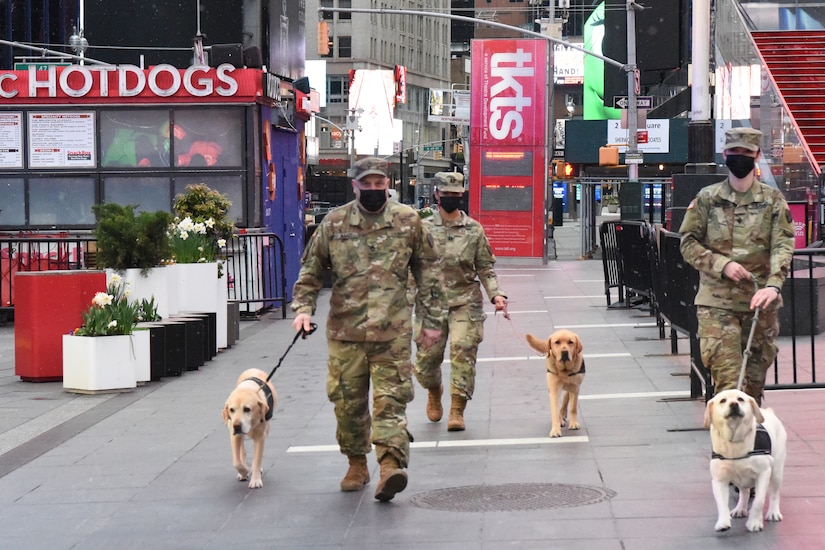May 14, 2020 | BY Air Force Tech. Sgt. Erich B. Smith ,
National Guard Bureau
With almost 47,000 National Guard soldiers and airmen
activated to fight COVID-19, this pandemic marks the Guard's largest domestic
response since Hurricane Katrina.
While more than 51,000 guardsmen responded to the
devastation caused by Katrina along the Gulf Coast in 2005, today's guardsmen
are answering the call to fight a pandemic that has spread nationwide and
beyond.
"In every single state across our nation, we have guardsmen
… who are working together with first responders and all of the organizations
and agencies to help shepherd us through to the other side of this
pandemic," said Air Force Gen. Joseph L. Lengyel, the chief of the
National Guard Bureau.
As the Guard begins its third month responding to the
pandemic, efforts are focused mainly on COVID-19 testing sites and the
distribution of medical supplies and food.
In April, guardsmen packaged, served or delivered more than
44 million meals to those in need while also transporting more than 34,000 tons
of bulk food to support food banks and other community-based programs.
"I have been unloading pallets, stocking food, packing
boxes and bags, loading supplies into waiting cars and assisting with
cleanup," said Air Force Staff Sgt. David Stefaniak, a boom operator with
the Washington Air National Guard's 116th Air Refueling Wing. "It's very
fulfilling to get to directly serve Washingtonians [who] are in need."
Additionally, guardsmen have supported 1,600 screening sites
nationwide that have tested more than 750,000 people.
"As medics, we handle certain challenges that others
may not experience," said Army Sgt. Valerie Hodges, a combat medic with a
Florida Army National Guard medical readiness detachment. "Everyone chose
the medical profession for personal reasons, and due to that choice, we are
here today helping the citizens of South Florida."
Meanwhile, the West Virginia Army National Guard set up one
of the first Defense Department-approved mobile testing labs.
"Once we arrive on-site, there's about a 60-minute
setup period in which we calibrate the machine," said Army 1st Lt.
Samantha Fabian, the commander of the West Virginia Army Guard's 1201st Forward
Support Company. "Once we complete calibration, then our lab is certified
and ready for operation."
Since April, guardsmen across the nation have been
distributing critical personal protective equipment items to those in need.
"One of our soldiers made a delivery to a smaller
nursing facility, and he was greeted by 15 to 20 staff members [who] were in
tears because he showed up with this [personal protective equipment] they
needed," said Army Staff Sgt. Jacob Schrot, with the Michigan Army
National Guard's 1st Battalion, 125th Infantry Regiment. "That really
opened my eyes to what's really going on out there."
Guardsmen have supported other missions as well. In eight
states, guardsmen staffed call centers answering almost 330,000 calls regarding
COVID-19 matters.
"COVID-19 is a unique situation that directly threatens
our communities," said Army 1st Lt. Michel Flickinger, with the New York
Army National Guard. "Although staffing a call center is not what many of
us foresaw when we joined the National Guard, it is a way for us to assist our
fellow citizens and connect them with the information they need."
The Guard also added almost 6,000 beds to alternate care
facilities back in April. In Connecticut, Air Force Airman 1st Class Arielle
Robles, an administration specialist with the Connecticut Air National Guard's
103rd Airlift Wing, was part of her unit's response in setting up a recovery
center on a college campus.
"It's crazy to see that where we would normally go for
class or to workout is being turned into a field hospital, but it feels good to
be helping the community and my school in this way," Robles said.
Guardsmen have also disinfected around 1,100 long-term care
facilities, nursing homes, correctional facilities and numerous public areas.
"[We spray] things like your doorknobs, handles on
anything — things that you are going to touch with regularity — and then [go
over the surfaces with] rags and a mop to ensure that our solution spreads and
has a lot of good contact time," said Army Sgt. Christina Burgess, with
the Oklahoma Army National Guard's 63rd Civil Support Team. "That way, we
can control any infection that could be around."
For local agencies seeking support, the Guard has provided
about 600 liaison officers to help facilitate the flow of communication between
the state and local agencies.
Army Command Sgt. Maj. Brian Webb, the senior enlisted
leader with the North Carolina Army National Guard's 60th Troop Command and a
liaison officer with state officials, said Guard members have a stake in what
happens in their communities.
"We bring our civilian skill sets into a military
environment," he said. "That plays a tremendous part in our
success."









No comments:
Post a Comment